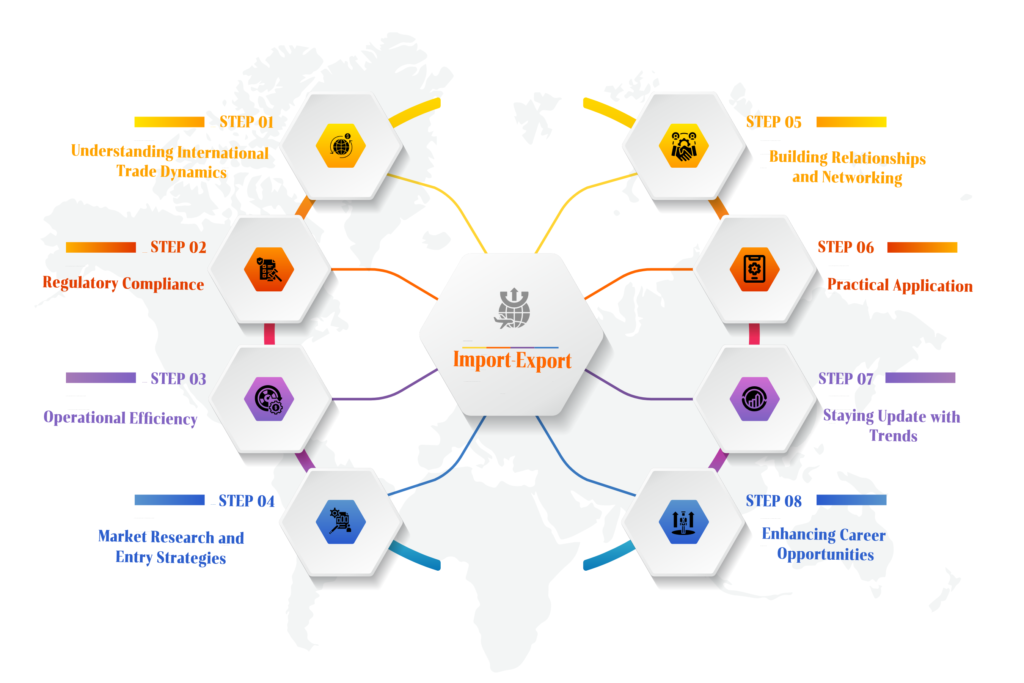
The import-export industry businesses and markets worldwide in today’s globalized economy. As trade barriers diminish and international commerce flourishes, the demand for skilled professionals in this field has never been higher. Import-export training is essential for anyone looking to advance their career in this dynamic sector. Here’s why investing in such training can significantly enhance your career prospects.
Why Import-Export Training Matters
Import-export training is essential for individuals and businesses involved in international trade. Here’s a detailed breakdown of why this training matters and the steps involved in the training process:

1. Understanding International Trade Dynamics :
- Global Market Awareness: Training helps participants understand how the global market operates, including trade agreements, tariffs, and regulations. International trade is just the process of these products moving between countries to meet demand.
- Cultural Sensitivity: Culture plays a significant role in shaping trade practices. Understanding local preferences, customs, and negotiation styles can make or break a deal. It teaches the importance of cultural differences and how they impact business negotiations and operations.
2. Regulatory Compliance :
- Legal Framework: Complying with regulations helps businesses avoid legal issues, such as fines, penalties, or even criminal charges. This protects both the company and its employees.
- Risk Management: Understanding how to navigate regulations helps businesses mitigate risks associated with penalties and fines. Consider various types of insurance, such as cargo liability insurance, to protect against financial losses.
3. Operational Efficiency :
- Logistics Management: Training covers essential logistics principles, including shipping methods, warehousing, and inventory management. Choosing the most efficient shipping methods and optimizing routes can lower shipping costs and delivery times.
- Cost Management: Participants learn how to optimize costs in the supply chain, which is crucial for maintaining competitiveness. Effective budgeting and accurate forecasting help businesses anticipate costs and allocate resources wisely, preventing overspending.
4. Market Research and Entry Strategies :
- Market Analysis: Training provides tools for conducting thorough market research, identifying potential markets, and analyzing competitors. You need to know how big the market is, and whether there’s a demand for your product or service.
- Entry Strategies: Participants learn various strategies for entering foreign markets, such as joint ventures, direct investment, or exporting. You can sell directly to customers, and distributors, or through e-commerce platforms, but you must ensure that logistics, pricing, and local regulations are clear.
5. Building Relationships and Networking :
- Negotiation Skills: Training often includes modules on effective negotiation tactics for dealing with international partners. Networking isn’t just about asking for favors.
- Networking Opportunities: Participants can build connections with industry professionals, suppliers, and potential customers. Engage in discussions, ask questions, and follow up with those you connect with.
6. Practical Application :
- Case Studies and Simulations: Many training programs include real-life case studies and simulations, allowing participants to apply their knowledge in practical scenarios. Trainees analyze actual cases from businesses involved in import and export.
- Hands-On Experience: Some programs may offer internships or hands-on projects to give participants real-world experience.
7. Staying Updated with Trends :
- Industry Updates: Import-export training often covers current trends in international trade, including emerging markets and technological advancements.
- Adaptability: Participants learn to adapt their strategies in response to changes in the global market.
8. Enhancing Career Opportunities :
- Skill Development: The training enhances skills relevant to international business, making participants more attractive to employers.
- Certification: Completing a recognized training program can lead to certifications that boost credibility in the field. Certifications can help you qualify for higher positions and better salaries.
Conclusion
Import-export training is crucial for anyone looking to succeed in the global market. Offering a comprehensive understanding of international trade complexities, it equips participants with the knowledge and skills needed to navigate challenges and seize opportunities in this dynamic field.
Investing in import-export training contributes to the overall success and growth of businesses engaged in international trade.
Yuva Course content :
1. Basics & Export – Import Cycle
- Continents, Opportunities, and Myths
- International Bodies and Local Bodies
- Export-Import Cycle
- Importer – Exporter Code (IEC) Online Application Process
2. Inco Terms & Payment Terms
- Types of Transportation, Containers and Packaging
- Incoterms (International Commercial Terms)
- Different Types of Payment Terms and Associated Risks
- Importance of Proforma Invoice & Various Aspects
3. Product & Market Selection & Research and Preparing Quotation
- Product Selection & Product Knowledge
- Market Selection & Research
- Free Trade Agreement (FTA) & Foreign Trade Policy (FTP)
- How to Prepare Quotation
4. Importance of Exhibition Visits, Identifying Buyers and Buyers Communication and Verification
- Importance of Trade Fairs & Exhibition for Export Promotion
- How to Find Genuine Buyers
- Buyers Communication & Verification
- Your company introduction to the buyer (Email to Buyer)
5. Pre & Post Shipment Documents, GST & Custom Clearance
- Full LC (Letter of Credit) Clauses
- Pre & Post Shipment Documents and Understanding its Need
- Goods and Services Tax (GST) & Custom Procedures
- Documents Practical
6. Import Procedures & Documents, Risk Management & Government Benefits
- Export Incentives
- ECGC (The Export Credit Guarantee Corporation of India Limited), Insurance,
- EEFC (Exchange Earners’ Foreign Currency) Account and Forward Contract
- Import Procedure & Documentation
- High Seal Sales
🚀Join us at Yuva Training Institute and unlock new career opportunities in the import-export industry!
📞 Call us now: +91 9099668817
✉️ Email: info@yuvaeximinstitute.com
What is EXIM training, and why is it important?
EXIM (Export-Import) training provides essential knowledge about international trade, helping businesses and individuals understand global markets, regulations, and procedures. It is crucial for anyone looking to start or expand their import-export business..
Who should take EXIM training?
EXIM training is ideal for aspiring entrepreneurs, business owners, working professionals, and students who want to build a career in international trade and logistics.
How does EXIM training help in starting an import-export business?
It equips you with practical knowledge about market research, documentation, customs clearance, payment terms, international regulations, and strategies for successful global trade.
Is EXIM training useful for working professionals?
Yes! Professionals in logistics, supply chain management, banking, and international marketing can enhance their careers with EXIM training by gaining specialized knowledge in trade operations.
Does Yuva Exim provide practical training in EXIM?
Yes, Yuva Exim focuses on hands-on practical training, including real-world case studies, live demonstrations, and expert mentorship to ensure you gain practical skills.
What are the career opportunities after completing EXIM training?
You can start your own export-import business, work in export houses, customs firms, freight forwarding companies, international marketing, or global trade consultancy.
Is a government-recognized certification provided after EXIM training?
Yes, Yuva Exim offers a government-recognized certification that enhances credibility and helps in business registrations and job opportunities.
How long does it take to complete EXIM training?
The duration varies based on the course structure, but most training programs at Yuva Exim are designed to be completed within a few weeks.
What support does Yuva Exim provide after course completion?
We offer post-training business support, mentorship, and guidance to help students successfully set up and grow their import-export businesses.
How can I enroll in Yuva Exim’s EXIM training program?
You can visit our website Yuva Exim and register online or contact us directly for more details.
